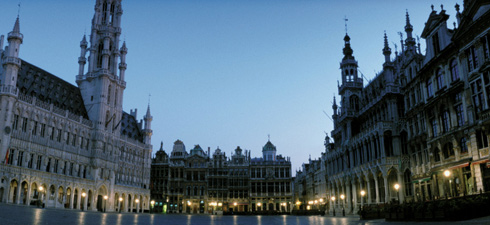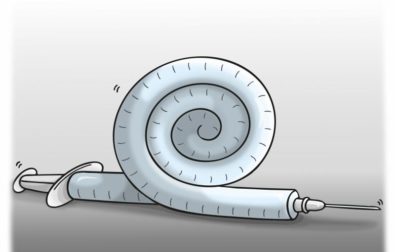When I got off the plane in Brussels, the snow and rain reminded me of a line by the American poet Archibald MacLeish: “All night in Brussels the wind had tugged at my door.”
It’s four in the afternoon and already dark as night. When I get to the Hotel Amigo, rue de l’Amigo 1–3, I feel at home again. Voices in every language, a bustling coming-and-going, but these discreet, comforting walls soothe my nerves. When I get to my room, I draw the curtains to find the familiar next-door office building facing me. Were I to open the window, I could easily start up a conversation with the tenants, those sedulous civil servants who work, while I sleep, till the wee hours of the morning. If I had the time to poke my head out, I could imagine seeing in their faces all those lives happy with failure. The delays they inflict upon their files are the royal jelly that feeds the State larvae. Above all, the civil servants administer time – a rare and priceless item.
In the outsized oval assembly hall, European ministers of culture also greeted us as though this was our last meeting. The wheel of fortune never stops turning, and many changes can occur in six months. In and amongst the usual faces, dazzled fresh ones would pop up all the time. Then everyone would speak of their particular concerns, seeking the complicity of kindred spirits. I seldom heard the word “Europe”. Was it taboo? Identities are so firmly entrenched that we have a long way to go before we can share them and embrace them as our own. Agreements involve endless discussions and we make headway slowly. France is often the most resolutely Community-minded, thanks to which good sense eventually prevails. The United Kingdom and its satellites are, generally speaking, disingenuous, ungrateful and self-seeking. Germany seesaws back and forth. The rest of us try to render our respective pasts compatible with the prospective future.
Hours and hours spent listening to my assiduous colleagues discourse in their respective languages. The British official gives the floor for a few minutes to his Welsh compatriot, who expresses himself in his native tongue, as I have done so many a time with representatives of our different linguistic communities. Languages constitute the greatest cultural heritage of the 21st century, and a command of languages – the more the better – is also an asset in the job market.
It occurs to me, as it did once to the German Renaissance sage Nicholas of Cusa, that the pleasure of knowledge isn’t so much knowing a thing as endlessly expanding the frontiers of the unknown, and our reward is the amplification of the “impenetrable secret”. Most of the time we’re here more to teach than to learn. Modesty and humility are often wanting – qualities which, for Spinoza, were a form of ambition: the desire to do what pleases men and avoid what doesn’t.
The culture we have shared over the course of so many centuries is the key to Continental solidarity, yet we still don’t know how to weld it all together. I have this strange sense of not knowing whether I entered European politics too late or too soon. Cicero saw his career more clearly: “I rose late, and on my way / the Roman night took me by surprise.” Cicero thought his political life had begun too late, when free Rome was already in free fall. Is Europe on the wane? Are nations or states in decline?
As I was leaving the oval hall and heading for the lift to re-emerge into foggy Brussels, I suddenly felt homesick. This is how the Romantics conceived of regression, returning to the place where neither good nor evil exists. “Where are we heading?” asked Novalis on behalf of all his European contemporaries. The question and the answer still apply to us today: “immer nach Hause” – always heading home. But where is home?
Morning is gone, as is part of the afternoon. The pale sun, enshrouded in mist, is about to disappear. At the restaurant Aux Armes de Brussels, I have mussels with chips on the side. The chips are small and don’t taste like the ones from Lorbé, but what can I do? Coming back out onto the street, I hear the winds from off the lake knocking at the hotel doors.
Was this article useful? If so we are delighted!
It is freely available because we believe that the right to free and independent information is essential for democracy. But this right is not guaranteed forever, and independence comes at a cost. We need your support in order to continue publishing independent, multilingual news for all Europeans.
Discover our subscription offers and their exclusive benefits and become a member of our community now!















